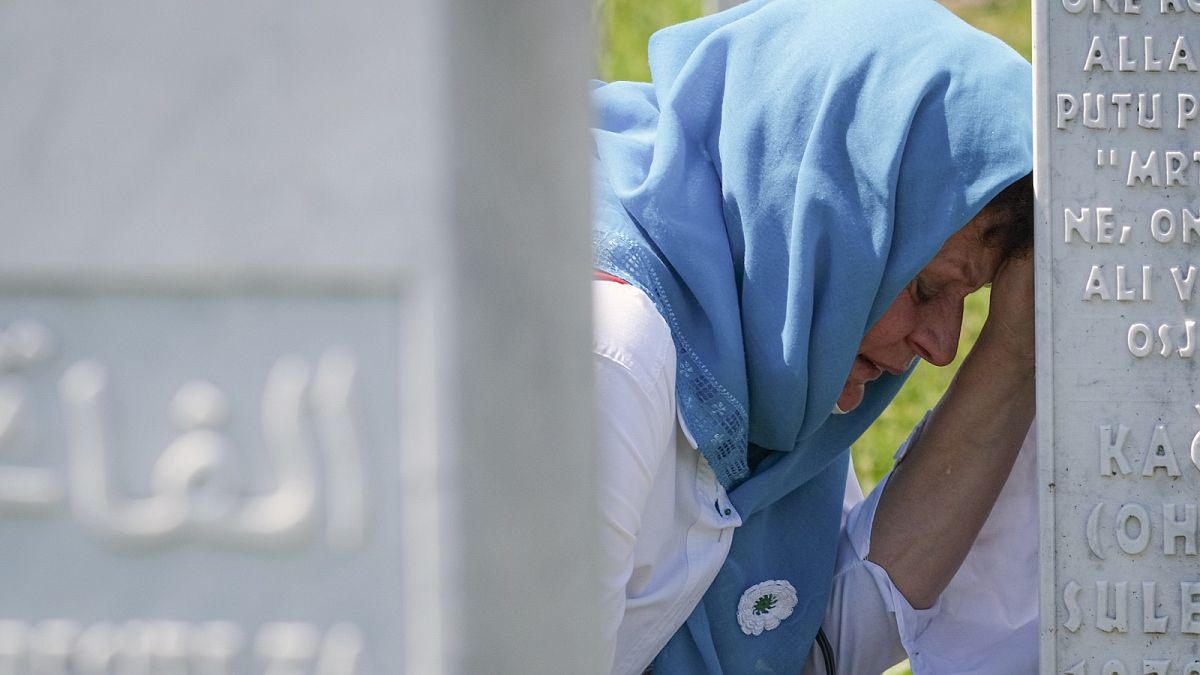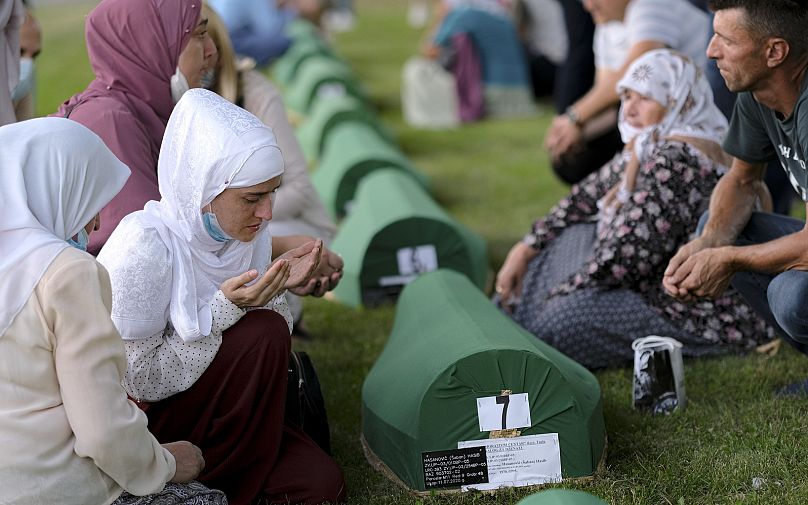25 years on from the massacre at Srebrenica, revisionism and glorification of the ethnic cleansing committed during the Bosnian War are giving impetus to extremists around the world to act with impunity.
I was in high school in 2004 when Dragan Čavić, president of the Bosnian Serb entity in Bosnia and Herzegovina, addressed the country live on television. Reading from a paper, seated on a chair with the Serb tricolour behind him, he ended his speech by looking at the camera and saying: “…after all of this, first as a man and a Serb, then as a father, brother, and son, and only then as the president of Republika Srpska, I have to say that these nine days of July, of the Srebrenica tragedy, represent a black page in the history of the Serb people.”
Bosniak victims were pretty much satisfied. A high-ranking Serb leader had publicly recognised and apologised for the largest massacre in Europe after the Holocaust. We felt we could move on, and a brighter, more positive future seemed close at hand. No one imagined that 16 years later, denial of the Srebrenica genocide would be bolder and more pervasive than ever. Čavić did not acknowledge the genocide on live television on his own initiative, however, but rather was persuaded to do so by British politician and diplomat, Paddy Ashdown and for that, Serb nationalists never forgave him.
In 2002, the victims’ families filed a total of 49 appeals to the Human Rights Chamber, all of which were related to the disappearance of Bosniak men and boys in Srebrenica in July 1995. The Human Rights Chamber was an international hybrid court in Sarajevo which served as a precursor to the Constitutional Court of Bosnia and Herzegovina. The families demanded that the Chamber order the Bosnian Serb government to provide information about the fate of their loved ones and the locations of mass graves.
The families knew that their loved ones were dead, but they wanted to know the entire truth about the circumstances of their deaths and what occurred afterward. The Chamber found that the Republika Srpska’s failure to disclose this information to the victims’ families was a human rights violation. As a result, the Bosnian Serbs formed a commission which was to produce a report on “the events in and around Srebrenica in July 1995.” The Chamber also ordered the payment of 2 million BAM (€1 million) to the Srebrenica-Potočari Memorial Centre as compensation.
The appeals came several months after the International Criminal Tribunal for the Former Yugoslavia (ICTY) had convicted Serb general Radislav Krstić for the genocide committed in Srebrenica and sentenced him to 46 years’ imprisonment in 2001.
Paddy Ashdown, the High Representative of the international community for Bosnia and Herzegovina at the time, was a former member British parliamentarian and had served in the elite Royal Marines. During the Bosnian War, Ashdown had been a strong critic of Western non-intervention. As someone who had witnessed first-hand the mass atrocities that had been committed in the country, he was determined to remove anyone who obstructed the implementation of the Dayton Peace Accords.
Thus, when the Bosnian Serb government began to waver in its drafting of the report, Ashdown and other members of the international community became angry. The initial version of the report, authored by self-proclaimed terrorism expert, Darko Trifunović, stated that genocide had not been committed in Srebrenica. The report went on to gauge the number of Bosniak victims “at less than 100,” and insisted that these victims were executed by rogue contingents of Bosnian Serb forces who had been acting “for personal revenge or out of simple ignorance of international law.”
Ashdown dissolved the commission and ordered that a new one be formed. With the backing of Western governments, he acquired a reputation for removing politicians from office and bypassing the parliaments by imposing laws that they could not - or would not - adopt. Thus, in the aftermath of the rulings by the ICTY, blatant denial of the Srebrenica genocide was not accepted.
On Ashdown’s insistence, a new investigative commission was formed. The Bosnian Serb authorities were forced to produce lists of members of the Bosnian Serb military and police forces who took part in the genocide. They also provided locations of potential mass graves where the remains of Srebrenica’s victims were supposed to be hidden, although most of these locations later proved to be false.
Nevertheless, this report was deemed acceptable by the Office of the High Representative and the surviving victims. Coming two years before the television address by President Čavić, it was the first time that the Bosnian Serbs had acknowledged the crimes committed in Srebrenica, to any extent, in an official capacity. Unfortunately, this positive development was short-lived. Ashdown’s mandate expired in 2006, and his successors proved indolent and ineffective by comparison.
That same year, Montenegro declared independence, stirring up Serb nationalism across the region. In addition, general elections were held in Bosnia and Herzegovina. Wartime political leader, Haris Silajdžić was elected as the Bosniak member of the tripartite federal presidency, while Milorad Dodik became prime minister of the Republika Srpska. Silajdžić campaigned to abolish the Serb entity while Dodik campaigned for independence. Čavić and his party, meanwhile, were punished by voters.
Fast-forward 14 years and Dodik is still in power; this time as the Serb member of the national presidency. Dodik’s goal was, and still is, to rewrite the narrative of the Bosnian genocide.
On his initiative, the Bosnian Serb National Assembly, on August 14, 2018, annulled the 2004 report on Srebrenica which acknowledged the genocide. The assembly also called for the establishment of a new commission to reinvestigate the events of July 1995 in Srebrenica and to publish a revised report. In February 2019, the Bosnian Serb government, at the initiative of Dodik and his Alliance of Independent Social Democrats (SNSD) party, announced the establishment of the Independent International Commission for Investigating the Sufferings of all Peoples in the Srebrenica Region in the Period from 1992 to 1995, as well as another commission with a mandate to investigate the wartime suffering of Serbs in Sarajevo.
Over the past 14 years, Dodik, with the support of his mentors and allies in Belgrade, has managed to create an elaborate network of historical revisionists and genocide deniers. The majority of international actors have remained silent as denial has grown. This network is large, strong, well-organised, and it permeates all parts of society - including the academic, political, and entertainment sectors.
These revisionist actors deny genocide, justify war crimes, and glorify war criminals. They peddle conspiracy theories and counter-narratives with no basis in historical facts or objective reality. Within Bosnia and Herzegovina, the opportunity provided by Čavić’s 2004 moment may be gone forever. Even more worryingly, Dodik’s deniers are gaining friends and support outside of the Balkans.
The 2019 Christchurch massacre should serve as a wake-up call. As the gunman drove to the Al Noor Mosque he was playing a Serb nationalist wartime song entitled “Karadžić, Lead Your Serbs” – the video for which, features footage of Bosniaks interned in Serb concentration camps. Similarly, Anders Breivik, the far-right terrorist who killed 77 civilians in Norway in 2011, was also inspired by Serb nationalism.
These events clearly show the potential for the genocide committed in Bosnia and Herzegovina to serve as an inspiration to far-right extremists throughout the world. The denial and glorification of genocide in Srebrenica is thus not just a problem for Bosniaks but also a global threat.
- Hikmet Karčic is a human rights activist and a genocide scholar based in Sarajevo
_____________
Are you a recognised expert in your field? At Euronews, we believe all views matter. Contact us at view@euronews.com to send pitches or submissions and be part of the conversation.

